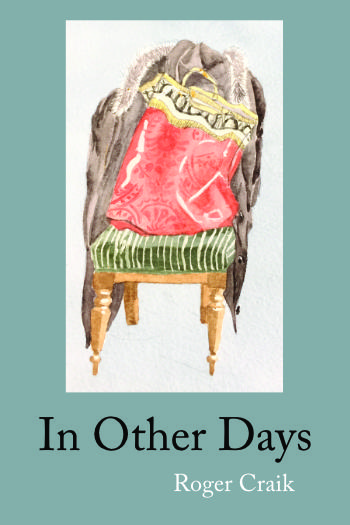
Roger Craik, Professor Emeritus of English at Kent State University, Ohio, has written five collections of poetry: I Simply Stared (2002), Rhinoceros in Clumber Park (2003), The Darkening Green (2004), Down Stranger Roads (2014), and In Other Days (2022) along with two chapbooks, Those Years (2007), (translated into Bulgarian in 2009), and Of England Still (2009). His poetry has appeared in several national poetry journals, such as The Formalist, Fulcrum, The Literary Review, The Atlanta Review, The London Grip and The London Magazine. English by birth and educated at the universities of Reading and Southampton, he has worked as a journalist, TV critic and chess columnist. Before coming to the USA in 1991, he worked in Turkish universities and was awarded a Beineke Fellowship to Yale in 1990. He is widely traveled, having visited North Yemen, Egypt, South Africa, Tibet, Nepal, Japan, Bulgaria (where he taught during spring 2007 on a Fulbright Scholarship), the United Arab Emirates, Austria, Croatia and Romania, (where from 2013-14 he was a Fulbright Scholar at the University of Oradea). He is glad every day that he is living in the USA. He watches the birds throughout the year, with joy.
Kristina Marie Darling: Your latest poetry collection, In Other Days, was recently launched by BlazeVOX Books. What are three things you’d like readers to know before they delve into the work itself?
Roger Craik: The poems in In Other Days were, in the main, written since the last book (Down Stranger Roads), but some were revisions, often pretty drastic revisions, of poor efforts written a good while earlier, where the governing idea struck me as reasonable, and maybe a line or two, but the rest anything but. Second, I tried not to drive my friend and publisher, Geoffrey Gatza at BlazeVOX out of his wits by revising, but of course one revises and revises, and not always for the better. One has to call a halt somewhere. I found it difficult to put the poems in an order. The beginning and end are chronological, starting with early childhood and teenage years (not much of the latter), and the last fifth, say, are shadowed by my mother’s advancing illness and death. Then there were all the others in between! I remember reading Philip Larkin saying “if the reader doesn’t like the current poem, perhaps he will dislike the next one less.” That is exaggeratedly wry, but variation is a good principle, I think, and I tried to work along those lines. On the other hand, I hardly ever tried to arrange the poems so that certain ones would “speak” to others. I thought that was beyond my control, and abilities too, probably. Lastly, I hope the collection gives the reader pleasure.
Buy a copy of, In Other Days, here
![BlazeVOX [books]](https://wp.blazevox.org/wp-content/uploads/2015/03/convoy-logo-7.png)